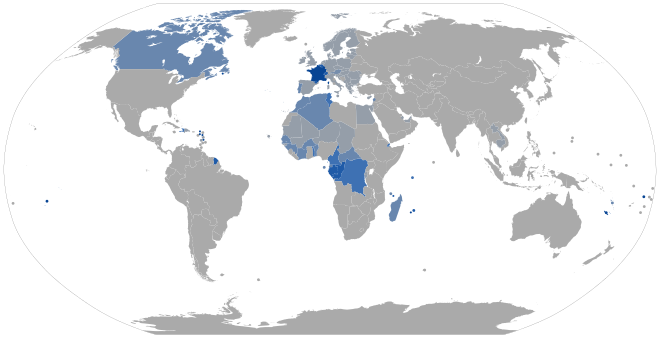
A | B | C | D | E | F | G | H | CH | I | J | K | L | M | N | O | P | Q | R | S | T | U | V | W | X | Y | Z | 0 | 1 | 2 | 3 | 4 | 5 | 6 | 7 | 8 | 9
The French language became an international language, the second international language alongside Latin, in the Middle Ages, "from the fourteenth century onwards". It was not by virtue of the power of the Kingdom of France : '"... until the end of the fifteenth century, the French of the chancellery spread as a political and literary language because the French court was the model of chivalric culture". Consequently, it was less as a centralising monarch than as a "gentle courtly prince" that the king unwittingly spread his language" and "the methods of expansion were not political"'.[1] This status continued to grow into the 18th century, by which time French was the language of European diplomacy and international relations.[2]
According to the 2022 report of the Organisation internationale de la Francophonie (OIF), 321 million people speak French.[3] The OIF states that despite a decline in the number of learners of French in Europe, the overall number of speakers is rising, largely because of its presence in African countries: of the 212 million who use French daily, 54.7% are living in Africa.[4] The OIF figures have been contested as being inflated due to the methodology used and its overly broad definition of the word francophone. According to the authors of a 2017 book on the world distribution of the French language, a credible estimate of the number of "francophones réels" (real francophones), that is, individuals who speak French on a daily basis either as their mother tongue or as a second language, would be around 130 million.[5]


Statistics
OIF figures

The following figures are from a 2022 report of the Organisation internationale de la Francophonie (OIF).[7] No distinctions are made between native speakers of French and those who learnt it as a foreign language, between different levels of mastery or how often the language is used in daily life.[8] For African countries where French is the main language of education, the number of French speakers is derived from the average number of schooling years.[8]
| Country | French speakers | % | Basis of projection |
|---|---|---|---|
| 29,731 | 1.04% | Adult Education Survey | |
| 14,903,789 | 32.86% | 2008 census | |
| 54,315 | 70.12% | 2009 national survey | |
| 10,105 | 0.34% | 2011 census | |
| 1,166,035 | 12.86% | 2012 Eurobarometer + Adult Education Survey | |
| 8,814,948 | 75.55% | 2012 Eurobarometer + Adult Education Survey | |
| 4,306,099 | 33.68% | 2013 census | |
| 25,523 | 0.79% | Adult Education Survey | |
| 157,440 | 2.30% | 2012 Eurobarometer + Adult Education Survey | |
| 5,403,610 | 24.45% | Demographic and Health Survey | |
| 1,073,506 | 8.50% | 2008 census | |
| 463,248 | 2.70% | 2010 OIF report + 2010 observations | |
| 11,490,652 | 41.17% | 2005 census | |
| 11,060,585 | 28.58% | 2016 census | |
| 61,000 | 10.8% | OIF survey | |
| 1,435,061 | 28.61% | Demographic and Health Survey | |
| 2,249,023 | 12.92% | 2009 census | |
| 4,636 | 0.01% | French embassy in Colombia 2016 | |
| 237,140 | 35.69% | 2003 census | |
| 3,518,464 | 60.69% | Demographic and Health Survey | |
| 5,231 | 0.10% | Rivard (2016) | |
| 95,650 | 2.36% | 2005 Eurobarometer + Adult Education Survey | |
| 339 | 0.003% | Zdroj:https://en.wikipedia.org?pojem=Francophone
